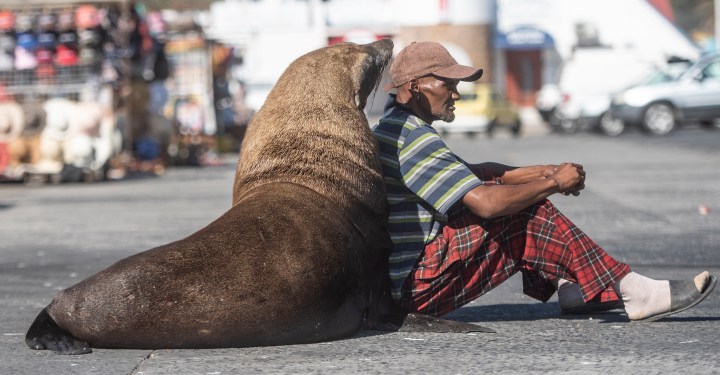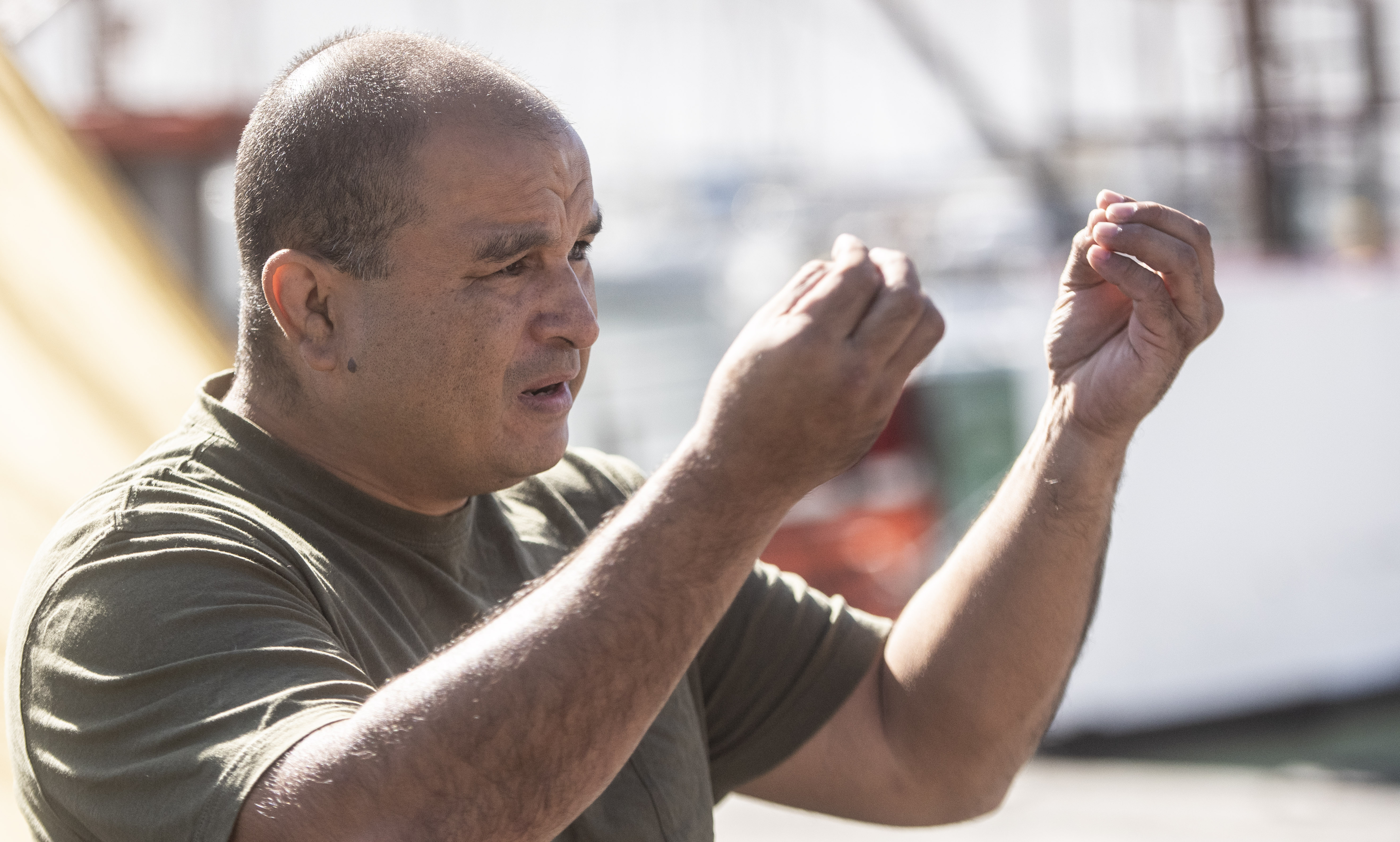BY HOOK OR BY CROOK
Illegal feeding of Happy the seal by desperate fishers a sign of hardship, hunger and depleted stock

Owing to depleted fish stocks and fishing quotas, Deon Barendse says he relies on Happy the seal to bring in tourist ‘donations’.
In Cape Town’s Hout Bay harbour, while Deon Barendse spoke to DM168, a seal named Happy waited for the fish the former fisher was cutting up with scissors.
Barendse uses the fish to pacify the seal, who then allows tourists to take pictures with him. The tourists give donations to Barendse.
“It’s almost 50/50 – I get him food, he makes sure my children get food. I don’t see a problem with him,” he says.
Feeding seals is illegal under the Threatened or Protected Marine Species Regulations, says Albi Modise, the chief director of communications in the Department of Forestry, Fisheries and the Environment (DFFE).
The department neither permits nor encourages members of the public to feed, take photos or interact with seals. They are wild animals and interaction encourages them to become “unnaturally habituated to humans”, Modise says. “Feeding encourages seals to become reliant on humans for food instead of foraging for their own food.”
Becoming reliant on humans creates behavioural problems. “Seals have been known unpredictably to become aggressive towards humans and bite individuals,” he adds.
This interaction, which Modise describes as “artificial”, causes seals to stop foraging, overeat, become obese and frequent harbours where they are at risk of injury.
The seals in the harbour come from a colony on Duiker Island, just off the coast of Hout Bay. Seals are common along Cape Town’s coast – from Hout Bay to Kalk Bay – where tourists snap pictures of them basking in the sun.

Rudy Quanson, a fisherman from Hout Bay, says fishing quotas and the permit system do not work as indigenous communities are often left out of equal shares in fishing allocations. (Photo: Brenton Geach)
According to the Two Oceans Aquarium, there are about two million Cape fur seals along the southern coastline, living in 24 to 40 colonies.
In 2020, complaints were raised on CapeTalk radio about the illegal feeding of seals. Callers said it was cruel towards the animals, with the seals often being hit by the feeders, or the feeders being rude to people who refused to donate.
At the time, the department’s Tots Dlulane, the national director of oceans and coast enforcement, said a possible remedy was to move the seals to the aquarium.
The aquarium told DM168 it has not housed seals since about 2006. Its seal teams worked at the V&A Waterfront, but would occasionally help seals elsewhere, including Hout Bay, where seals often become entangled in litter.
“The DFFE has considered various options to solve and regulate this issue,” says Modise. The removal of seals was found not to be viable for various reasons.
Modise says the department has increased its visibility at the harbour. In February, an illegal seal feeder was arrested.
Feeding and harassing seals is a criminal offence, which carries maximum penalties, including imprisonment up to five years, a fine of up to R5-million, or both.
Barendse started interacting with seals 14 years ago when the quantity of allocated fishing catches was dropped. “I decided I loved animals so I communicated with [the seals] and I treated them like [I treat] dogs at home.”
Barendse was caught by authorities three years ago and received six months’ in jail, suspended for three years.
“At the end of the day, there’s no work for us,” he says.
Other fishers tell similar stories: depleted fish stocks and fish quotas have left the fishing community, predominantly from the suburb of Hangberg, despondent.
A 2021 National Data and Information Report for Marine Spatial Planning states that 75% of all South Africa’s fishing takes place in the Western Cape. Nationally, the fishing industry employs 41,000 people directly and creates 81,000 jobs indirectly.

Hout Bay fisher John Esau (62) has worked in the fishing industry for more than 50 years. (Photo: Brenton Geach)
But this comes at a cost: species such as abalone, yellowfin tuna, West Coast rock lobster – species often caught by the Hout Bay fishers – were listed as “severely depleted”. The number of stocks considered overexploited increased from 12 in 2012 to 15 in 2016.
John Esau (62) says he has been a fisher for almost 50 years, mainly catching snoek. Now, fish are hard to find and he has to wander the harbour, joining crayfish catchers. “The little crayfish that I have, it’s nothing… I need to put food on the table.”
The department says it periodically conducts a Fishing Rights Allocation Process, which gives individuals and companies the opportunity to obtain commercial fishing rights.
Modise says the department is also rolling out a small-scale fishing sector, “which prioritises previously marginalised groups of fishers, people who depend on marine resources for their livelihood and those who have a history of fishing as defined by the Marine Living Resources Act”. DM168
This story first appeared in our weekly Daily Maverick 168 newspaper which is available for R25 at Pick n Pay, Exclusive Books and airport bookstores. For your nearest stockist, please click here.






















 Become an Insider
Become an Insider
This story about fishermen with no quotas and having to resort to using the seal for income in Hout Bay harbour is hogwash. That poor seal, and previous, have been abused for many years by the so-called fishermen feeding him. About 15 or more years ago I saw tourists sitting on the seal and being photographed by their friends. The asian tourists were particular culprits. They were lining up to do the sitting and photographs with much laughter amongst their group, and paying the seal minder. I gave them all a verbal blast for animal abuse and asked how they would like it if we sat on them for photos. They were taken aback and left. This resulted in the seal feeder threatening me with all sorts of abuse for taking away his income – ripe language that would make a sailor blush. This practice in Hout Bay is nothing but animal abuse and exploitation for tips/income by local lazy individuals. It has been going on for 10 to 20 years. Just google and you will find articles from many years ago with a 2009 one noting that Environmental Affairs would prosecute anyone caught feeding the seals. There was one person who used to hang the food from his mouth and let the seal take it. The writer of this article should get her facts straight and call it what it is – animal abuse. It has nothing to do with depleted fish stocks and quotas. Is it okay to go out and feed all the baboons on the Peninsula and get them to perform tricks for the food because people have no jobs? Same difference !